In order to run your reCaptchaCallbackInAndroid exposed method from JavaScript, when the user submitted a successful reCAPTCHA response, first make sure, to actually listen to the reCAPTCHA callback via g-recaptcha tag attributes:
<div class="g-recaptcha"
data-sitekey="{{your site key}}"
data-callback="myCustomJavaScriptCallback"
></div>
or via the reCAPTCHA v2 JavaScript API:
grecaptcha.render(
'g-recaptcha-element-id', {
sitekey: '{{your site key}}',
callback: 'myCustomJavaScriptCallback'
}
)
then, when the page finished loading in the WebView, add your JavaScript callback function to the window object using webView.loadUrl:
webView.loadUrl("""
javascript:(function() {
window.myCustomJavaScriptCallback = function(token) {
android.reCaptchaCallbackInAndroid(token);
}
})()
""".trimIndent())
and finally, when the user submits a successful reCAPTCHA response, your myCustomJavaScriptCallback will be called and through that, your exposed reCaptchaCallbackInAndroid method too with the reCAPTCHA token.
Since you're using Kotlin, in this case, you can just simply use multiline string literals.
Since you're exposing a method to JavaScript, make sure to know the security concerns.
In case you'll need additional JavaScript injection in the future (more method exposure, DOM manipulation, etc.), check out this post.
In your case:
Set reCAPTCHA to call your captchaResponse JavaScript function via tag attribute:
<div class="g-recaptcha"
...
data-callback="captchaResponse"
...
></div>
or via its API:
grecaptcha.render(
'...', {
...
callback: 'captchaResponse'
...
}
)
and add your captchaResponse callback function to window:
webView.loadUrl("""
javascript:(function() {
window.captchaResponse = function(token) {
// your code here before the Android callback...
android.reCaptchaCallbackInAndroid(token);
// ...or after the Android callback
}
})()
""".trimIndent())
Test:
Here's a simple, Empty Activity in Android Studio (using Kotlin) with a basic LinearLayout (an EditText and a Button within the layout) and the MainActivity.kt:
package com.richrdkng.injectjsintowebview
import android.net.Uri
import android.support.v7.app.AppCompatActivity
import android.os.Bundle
import android.webkit.JavascriptInterface
import kotlinx.android.synthetic.main.activity_main.*
import android.webkit.WebView
import android.webkit.WebViewClient
import android.widget.Toast
class MainActivity : AppCompatActivity() {
override fun onCreate(savedInstanceState: Bundle?) {
super.onCreate(savedInstanceState)
setContentView(R.layout.activity_main)
sendButton.setOnClickListener { loadWebpage() }
}
@Throws(UnsupportedOperationException::class)
fun buildUri(authority: String) : Uri {
val builder = Uri.Builder()
builder.scheme("https")
.authority(authority)
return builder.build()
}
@JavascriptInterface
fun reCaptchaCallbackInAndroid(token: String) {
val tok = token.substring(0, token.length / 2) + "..."
Toast.makeText(this.applicationContext, tok, Toast.LENGTH_LONG).show()
}
fun loadWebpage() {
webView.getSettings().setJavaScriptEnabled(true)
webView.addJavascriptInterface(this, "android")
webView.getSettings().setBuiltInZoomControls(false)
webView.loadUrl("https://www.richrdkng.com/recaptcha-v2-test/")
webView.webViewClient = object : WebViewClient() {
override fun onPageFinished(view: WebView, url: String) {
super.onPageFinished(view, url)
webView.loadUrl("""
javascript:(function() {
window.onCaptchaSuccess = function(token) {
android.reCaptchaCallbackInAndroid(token);
}
})()
""".trimIndent())
}
}
}
}
then using a simple reCAPTCHA v2 test website, the window.onCaptchaSuccess function is called upon a successful reCAPTCHA submission and the reCAPTCHA token is partially displayed in a Toast using an Android Emulator:

Full disclosure: I made the reCAPTCHA v2 test website to prepare/test/debug similar situations.
